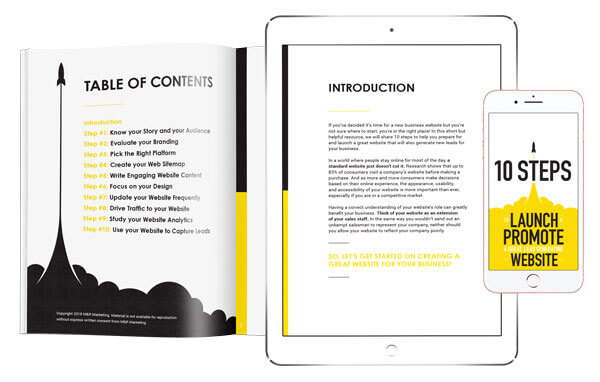
This article was most recently updated in Nov. 2024
It’s frustrating to visit a website for an answer to a question or a solution to a problem and find content that’s minimally informative. In situations like this, how often do you go back to the search to find a better-quality site?
It can take a potential customer less than a second to decide whether your site is worth spending time on or not. Actually, it takes way less than a second. According to new statistics from 2023, it now only takes users about 50 milliseconds – that’s only 5% of a second – to form an opinion about your site.
First impressions almost always have to do with the visuals–is your site attractive, eye-catching, and modern? If it is designed well and keeps the user on your site, the next critical factor that determines whether they will stay is your content.
A website’s quality of information can boost or deflate your online presence. Small- to mid-size businesses like law firms, non-profits, medical practices, retail companies, and service industries greatly benefit from informational websites that provide detailed overviews of their products and services. It’s critical to provide a well-designed, informative website that attracts users and captures their attention.
Here are four desirable qualities of an informational website:
#1: An Updated Informational Website Showcases Timely Information
It might be obvious, but informational websites must present information. What’s less obvious from the name is that the information has to be current. Whether it’s through complete product details on your online store or broadly encompassing content on your services pages, your information will draw target audiences in and keep them interested enough to remain on your site. Ideally, those in your target market ultimately follow a call to action based on the information you present.
An informational site is also a perfect platform to share other facets of your company or organization. People aren’t always looking for the answer to a current problem you can solve. Sometimes they want to learn more about:
- Company history
- Years of experience
- Location info
- Upcoming events
- Current promotions
But all of that information must be current. One of the fastest ways to lose an audience is by giving them information that they already know to be or can easily tell is out of date. By creating a robust, regularly updated, informational website, you will positively serve both potential target customers and current ones.
#2: An SEO-Optimized Informational Website Improves Your Visibility
Search engines reward websites that have well-written, relevant, and current content by ranking them higher in search results. A website that incorporates search engine optimization (SEO) best practices into its informational content will perform better on search engines and increase the likelihood of more traffic.
Relevant Keywords
Relevant keywords are one of the leading aspects of SEO. Your business or organization offers specific products or services, and your target audience is looking to find the solutions you provide. Show up in front of these users by researching the keywords and keyword phrases they use in their searches and working them into your informational website.
Your primary and secondary web pages should feature the right keywords throughout their content. You can also produce blog articles on a consistent basis to expand your keyword usage and highlight industry news. Regularly providing fresh blog content gives your customers more opportunities to find you in their searches. They will also have more reasons to return to your website. Blogs can even establish you as an industry leader.
AI Visibility
In May 2024, Google completely changed the shape of the search landscape with the wide introduction of AI Overviews to their search pages. Now, many user questions are answered directly on the results page, in an AI-generated blurb alongside links to the pages where the AI found the information it used in its answer.
These AI Overviews appear primarily on searches that Google perceives to be informational in nature – in other words, they’re more likely to show up when someone searches “how do I make lemon bars?” (informational search) than when someone searches “whole foods” (navigational search – how do I get to Whole Foods?).
Having accessible but detailed answers to searchers’ common questions on your site improves your chances of appearing in these AI Overview features, further improving your company’s visibility!
#3: A Responsive Informational Website Helps Mobile Users Find You
The mobile user’s experience on your website is vastly important. Well over half of all your site’s visitors will be viewing it on a mobile device. That’s not all. When search engines survey your site, one of the main things they’re looking for is a good user experience. Mobile is so important that Google and other search engines now rate the mobile experience first, and often never even crawl the desktop version of a site.
Responsive sites employ a single layout that responds to the format of whatever device someone is using, seamlessly adapting a page’s elements to fit progressively smaller viewing screens and offering the same high level of navigability for both mouse and touchscreen users. Responsive sites offer fluidity, better formatting, and easier maintenance capabilities.
By creating an informational, responsive website, you are sure to improve your online presence and increase traffic to your site.
#4: A Custom Informational Website Builds Your Brand
Your website is one of your company’s top brand ambassadors. When visitors approach your site, those who don’t know your brand will familiarize themselves with it through your site’s content, design, colors, and tone. Those who do already know your brand will be expecting an experience that reinforces that brand and fits with the mental picture they’ve already established.
Your informational website should include features that make it not just customized to your company, but unique to your brand. Visitors want to see you in your website’s:
- Design, fonts, and colors
- Content voice
- Imagery and videos
- Work portfolio
- Photo galleries
- Product photography
Even often forgotten or neglected parts of a site, such as the way links are worded or how information flows through a particular content page, are a reflection of your brand and an opportunity to do something that’s uniquely yours. It’s important to include features that personalize your website and keep your visitors engaged.
M&R’S WEB DESIGN PORTFOLIO
M&R Marketing specializes in dynamic, engaging informational websites for clients ranging from brewers and builders to markets and municipalities. See some examples of our web designs.
Want to Learn More About Web Design?
Check out our Definitive Guide to Web Design for even more details about the ins and outs of an exceptional informational website.
WEBSITE DESIGN SERVICES FROM M&R MARKETING GROUP
Building a custom, responsive, informational website requires experience and expertise. Luckily our in-house team of copywriters, graphic designers, and web developers provides comprehensive web design services. We’d love to talk to you about creating an informational website for your company or organization: 478-621-4491
Detailed Marketing Deets
Want some profound insight into all things marketing? Check out our Definitive Guide Series for detailed information, tips, and advice regarding:
- Branding
- Business Listings Management
- eCommerce
- Email Marketing
- Geofencing & Location-Based Marketing
- Local SEO
- Marketing Plan
- Photography
- Search Engine Marketing
- Social Media Management
- Video Marketing
- Web Design
Never Miss An Article – Sign Up for Our Monthly eNewsletter!
Ready to Learn More About Launching a Great Website?


